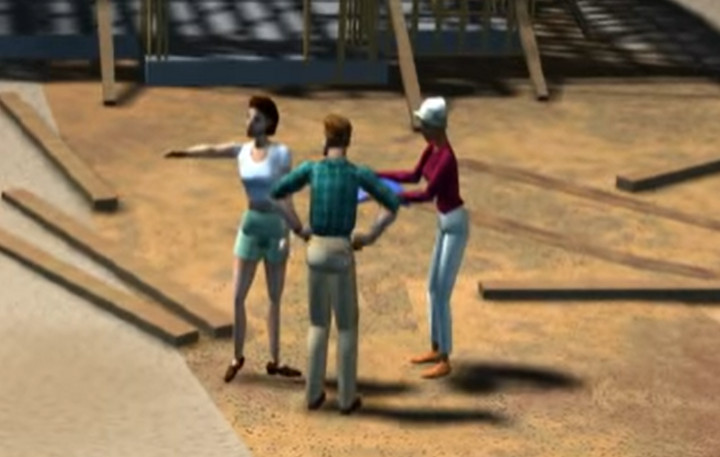From SimCity to The Sims: The Untameable Success of Will Wright’s Sandbox

In the beginning of 2000, the world was breathing a collective sigh of relief after the Y2K panic had blown over without causing an apocalypse. People could once again look to the future without worrying about the imminent collapse of society (though some folks will worry about that no matter what’s happening in current events). The future was starting to look pretty good again.
In February of that year, Maxis released a game that would have an enormous impact on the world of gaming, spawning a franchise that would last decades. This franchise, of course, was The Sims. Yet The Sims wasn’t entirely new; in case it’s not clear from the title, The Sims is actually a spinoff of the much older SimCity series.
Back in the late 1980s, a game developer by he name of Will Wright was sitting on a pile of cash after stumbling into unexpected success. In 1984, he created a helicopter PC game called Raid on Bungeling Bay for Broderbund Entertainment (who had just one year earlier released Lode Runner), which unexpectedly became a million-plus seller when it was ported to the Famicom in Japan. Wright had enough money in his pockets that he could live comfortably for a while, which gave him the freedom to work on whatever wild project he came up with next.
While Broderbund would go on to publish the beloved Prince of Persia series, Wright headed in a completely different direction. Wright, it seems, was more interested in the real-world drama of urban development than science-fiction or fairy-tale adventures. In fact, he is on record as having said, “It occurred to me that most books and movies tend to be about realistic situations. Why shouldn’t games be?”
If you squint your eyes and tilt your head to the left about 30 degrees, you can maybe see how this line of thinking would lead the developer of a helicopter-based war game to create SimCity. (Raid on Bungeling Bay actually reminds me a bit of Desert Strike: Return to the Gulf, which released about eight years after Wright’s helicopter hit.)

Wright seemed to have had aspirations for SimCity (which released for PC in 1989) to be an educational game, or at the very least, a game that had an element of educational value to it. He had gone to Montessori school as a child, and grew to value abstract, independent learning activities. In an interview with The New Yorker, Wright said:
Montessori taught me the joy of discovery. It showed you can become interested in pretty complex theories, like Pythagorean theory, say, by playing with blocks. It’s all about learning on your terms, rather than a teacher explaining stuff to you. SimCity comes right out of Montessori—if you give people this model for building cities, they will abstract from it principles of urban design.
Of course, most of us just saw SimCity as a sandbox where we could see what sort of destructive horrors we could unleash upon a fully developed city full of innocent civilians.
Anyway, The Sims came out 11 years after the first SimCity game. While SimCity focused on the development of a full city, The Sims narrowed its focus to explore the lives of the citizens who inhabited those cities. The Sims is about interpersonal drama, it’s about finding jobs and getting into relationships and having naked hot tub experiences while fantasizing about Abraham Lincoln…

Well, more the first two, though the game’s trailer does suggest the third.
The Sims gives players a suburban sandbox in which to survive, thrive, and make woohoo happen. It’s somewhat mundane on paper, mirroring real life perhaps a bit too closely, though in practice it can become addictive very quickly. Fans will regale you with tales of all-night marathons, of rushing home from work to get back to the stresses and cares of the virtual world.
The Sims also provides a digital playground for experimenting with your more psychopathic tendencies. Sims can be terribly neglected, left to starve to death or wet themselves in front of the neighbors. Building a pool without a ladder will cause Sims to drown, and Sims with low cooking skills can potentially start fires and perish in the resulting blaze. For some players, tormenting and murdering Sims is the whole reason to play. In fact, the Sims Wiki features a lengthy guide on all of the various ways to kill a Sim.
The sandbox qualities of The Sims made it a fascinating testing grounds for psychologists as well. An honor student by the name of Thaddeus Griebel published a study in 2006 that explored the relationship between people’s real-world personality traits and their behavior within The Sims. The study begins with a justification for this type of research:
When the videogame Mortal Kombat was released in 1993, a massive debate erupted over videogame violence. Since then, most psychological research on videogames has focused only on negative aspects of this relatively new form of entertainment (Anderson, Funk, & Griffiths, 2004). Not until recently have psychologists and sociologists begun studying other aspects of videogames, besides violence and aggression. For instance, the National Aeronautics and Space Administration (NASA) incorporated biofeedback technology with videogames in order to help increase attention abilities in children with Attention Deficit Hyperactivity Disorder (ADHD) (Braukus, Henry &, Gardner, 2000). Also, a study at Loyola University found that certain online computer games, such as Counter-Strike, foster complex social interactions, which helped remove the stigma that videogame players are socially isolated (Wright, Boria, & Breidenbach, 2002).
In the study, 30 volunteers were given personality tests, then made to play The Sims 2 for 10 hours over the course of six weeks. Their personality test results were then compared with their in-game behavior. The study did seem to find some measure of correlation between the two.
Finally, after conducting this empirical study on The Sims 2, there is supportive evidence to show that, yes, people do indeed project some aspects of themselves into their Sims. From the results of this study, we have seen that personality traits such as neuroticism, openness to experience and conscientiousness, values such as flirting, fidelity to one’s partner, wealth and creativity and other characteristics such as gender, race, age, need for cognition, number of enemies and parent’s marital status all relate to the different ways people play The Sims 2.
I’m a bit skeptical of the results, as I don’t think the comparison is perfect. While there are absolutely people who will project their real-world values onto their Sims, there are others who will use The Sims as a way to experiment with behaviors that they would never exhibit in the real world. I’ve mentioned this before, but my characters in The Sims tend to be extremely promiscuous, having woohoo time with absolutely everybody they know, while I’ve never cheated on a significant other in real life. I’m sure there are perfectly lovely people who would never hurt a fly in the real world, yet they derive ludicrous amounts of pleasure from using broken appliances to electrocute Sims to death.

And even Griebel was hesitant to call the results conclusive. The study claims:
However, this study is only the first of its kind. It is important that the results discovered in this study are replicated in future research and that other factors of the game are explored as well, especially if the game is to be used in a clinical setting. This project only marks the beginning of understanding self-projection in The Sims 2; much research has yet to be done.
Still, it’s fascinating to see an experiment like this being performed at all, and I’m curious to learn more about the correlation between personality type and gameplay behavior.
I think it’s pretty clear that The Sims had the potential to reach audiences that previous video games had been unable to. Even if you aren’t particularly interested in shooting Space Marines or slaying dragons, or even jumping on platforms, you can probably find something relatable in the suburban environment of The Sims.
And that’s something that has proven itself over time. The Sims would smash video-game sales records and become a moneymaking behemoth. In 2019, it was reported that The Sims franchise had surpassed $5 billion in lifetime sales.
Whether you’re a psychologist, a psychopath, a “casual gamer,” or just a person who loves video games, the world presented by The Sims is a fascinating and addictive one, ripe with possibility. Considering The Sims 4 is still being supported with new content six years after its initial launch, and a Sims-based reality show called Spark’d launched in July of 2020, I don’t think this franchise will be disappearing any time soon.
